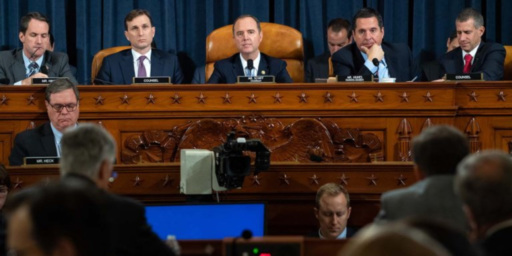Example of Why Individual Defense Advocates Are Rare on the Federal Bench
Republicans competing to see who can be the toughest on crime

One of unfortunate truth about Federal Judgeships is that one of the best routes to one is through a prosecutor’s office. The Cato Institute’s Clark Neily published an in-depth study on the topic in 2019 (later updated in 2021) that established that “[f]ormer courtroom advocates for government (389, 44.20 percent) now outnumber former advocates for individuals against government (57, 6.47 percent) by nearly seven to one.”
While President Trump’s nominations were especially biased towards prosecutors–appointing former prosecutors over defense attorneys at a rate of 10 to 1–the reality is that Democratic Presidents are not much better. For example, the news site Splinter notes that as of 2015 “just 14% of President Obama’s nominees for district and appeals court judges had experience working in public defense. Meanwhile, 41% of his nominees had experience working as prosecutors.”
To understand part of the reason for this, one need look no further than Wednesday’s Senate Judiciary Hearing for Nina Morrison, President Biden’s nomination for a Federal Judgeship in New York’s Southern District. Morrison, after clerking for a judge on Second Circuit’s Court of Appeals, has spent most of her career representing convicted individuals and engaging in civil rights litigation. Through her work with the Innocence Project, Morrison has been lead or co-counsel in cases that have overturned the convictions of more than 30 wrongfully convicted people.
During the hearing, a number of Republican members of the judicial committee specifically attacked her on that record. Take, for example, this line of attack from Ted Cruz:
“I will confess, the whole of your record is deeply disturbing. Across this country, Americans are horrified at skyrocketing crime rates, skyrocketing homicide rates, skyrocketing burglary rates, skyrocketing carjacking rates — and all of those are the direct result of the policies you spent your entire lifetime advocating.”
https://www.courthousenews.com/judiciary-committee-pivots-after-gop-senator-opposes-home-state-nominee/
Cruz was joined in these attacks by fellow GOP and Ivy League trained lawyers, Josh Hawley and Tom Cotton. While Cotton questioned her on why she was continuing to advocate for an individual who was already executed*, Hawley used this as an opportunity to attack reforms to the criminal legal system in general:
“You describe her as part of a cohort of prosecutors who seek a new approach to justice, and in particular seek to reform current tough-on-crime practices,” [Josh] Hawley alleged. “Now I, actually, I do agree with that characterization. I think you accurately have described the behavior of prosecutors in my state. They have reformed ‘tough on’ current practices. In fact, I’d say they’re pro-crime. They’re pro-criminal practices.”
https://www.washingtonpost.com/politics/2022/02/17/nina-morrison-nomination-cruz-hawley/
It’s almost as if these (again, Ivy League trained lawyers) have forgotten that our legal system is, in part, based on a Constitutional guarantee of defense counsel in criminal cases. Maybe they were all absent that week.
That said, what stands out about these attacks is that they were not as much focused on Morrison’s work as a client advocate as they were the role she has played in advising the so-called “Progressive Prosecution” movement. The movement, with people like Philadelphia District Attorney Larry Krasner at its center, focuses on expanding the options that prosecutors have for dealing with lower-level crime, implementing conviction integrity units that investigate allegations of wrongful convictions, and supporting other reform movements like the elimination of cash bail.
Progressive prosecutors have long been a target of the right-wing. And it is true that we are seeing a nationwide increase in certain forms of crime (though we are also still a long way from where we were in the ’90s when the rate most crimes peaked and, additionally, we have yet to see if this will be a sustained trend). Still, these attacks are deeply disingenuous.
First, there is no evidence that progressive prosecution or criminal justice reforms specifically led to the current increase in crime. In fact, the upward trend is nationwide and has held true in counties with “tough on crime” prosecutors and places that have increased police funding (see for example Shelby County which has seen its crime rates grow proportionally to that of the rest of the country while having a multi-term “tough on crime” prosecutor).** So while these talking points are great from a moral panic point of view, there is very little evidence to actually back them up.
And yet, they demonstrate the challenge that advocates face in the process. And this has deep implications for defendants in federal cases. It means that the majority of judges they will appear before, consciously or not, may be more likely to take the prosecution’s view of things. And equally important, when it comes to evaluating the implementation and interpretation of criminal law, those judges are often more sympathetic to the government’s position. On this Neily makes the following arguement:
The radical imbalance between former government advocates and former government opponents on the federal judiciary is particularly concerning when we consider what federal judges actually do, as well as the key role of the judiciary in our system of government. While the bulk of the federal court docket involves disputes between private parties, around 20 percent of all federal cases are criminal prosecutions, with another 15 percent involving various challenges to government power, including civil rights cases and habeas corpus petitions. Some of these are literally a matter of life and death—and not just in capital cases—whereas others involve constitutional challenges to laws that restrict people’s ability to work, speak, worship, travel, get married, or raise their own children. Other cases involve fundamental questions regarding the size, scope, and nature of government power, including the legitimacy of our ever‐expanding, increasingly unaccountable federal bureaucracy. If a person’s last job before judging the legality of that bureaucracy was representing its interests in court, who could fault the civil rights plaintiff for suspecting that the agency she’s suing might enjoy a bit of a hometown advantage?
As demonstrated above, when criminal and civil rights cases pitting individuals against government are filed in federal court, the chances are nearly 45 percent that they will be heard by a judge who served as a courtroom advocate for the government (but never for individuals against government), whereas there is only a roughly 6 percent chance that the case will be heard by a judge who represented individuals in cases against the government (and never served as an advocate for government). No prosecutor would relish the prospect of trying a case before a jury half‐filled with former criminal defense attorneys—just as no criminal defendant relishes the idea of going before a judiciary half‐filled with former government advocates. But for now at least, that’s the system we have.
https://www.cato.org/study/are-disproportionate-number-federal-judges-former-government-advocates#procedure-findings
Yet, it’s exactly the resistance that Morrison faces that makes Presidents who might be otherwise inclined, hesitant to nominate individual advocates. And as a direct result of that, we haven’t had someone with individual defense experience on the Supreme Court in over a decade. Additionally, what these hearings demonstrate is that we are seeing a future where not only will advocates face serious headwinds, but also prosecutors who come from the wrong types of offices (i.e. the ones that seem to actually care about avoiding convicting people who didn’t commit the crimes they are accused of).
And that is not good for the health of our federal courts.
* – Cotton might have been saving his “tough on crime” hot takes for later in the day when he blamed the Democrats for the First Step Act, which… *checks notes*… was passed when Republicans held both the House and Senate and was pushed for and signed by Republican President Donald Trump.
** – This trend is also true for the previous decade-long drop in crime which happened across the board regardless of what local policing and prosecution strategies had been implemented. This highlights the probability that there are many complex factors at play, many of which may be outside the realm of the criminal legal system, in both the rise and decrease of crime.






Advocating for the wrongly accused is an unalloyed civic good. It is probably the best thing you could ever do with a JD in your pocket.
Correcting an injustice. Also letting the cops and prosecutors know they arrested and convicted the wrong person and the one who actually did it got away with it and is still out there.
Dinging the Innocence Project to score points is essentially evil.
(Disclosure – I donate annually to the Innocence Project)
They haven’t forgotten anything. You’re confusing electoral theater for substantive questioning. While I can’t stand any of the three, they’re anything but stupid. They’re doing exactly what they’ve set out to do there, and that isn’t to engage in meaningful interrogatory.
@HarvardLaw92:
I completely agree with that. I also wanted to tease out part of the impact it has on the makeup of the bench.
Aside: I have to admit that every time I write about the federal bench or these issues, I wait to see how the article lands with you and if you see any glaring errors.
@HarvardLaw92: I was going to go for a response to “maybe they’ve forgotten…” with “or maybe they’re just demagogues.” I prefer your gentler, less accusatory statement better, though.
“Better for a hundred innocent men to die than for one guilty man to go free.” — Republicans
@Matt Bernius:
You do a good job as far as I can tell. I try not to be Miss Beadle with the red pen 🙂
@just nutha:
It sounded better than “They’re just generating sound bites for Fox because they never stop running for office”
For a long time it’s been my thought that (at least at the state level), there should be a single “Department of Justice” with one dedicated State Prosecutor and one dedicated Public Defender–with all other attorneys pulling prosecution and defense duties randomly on a case-by-case basis. The department would have a single budget, and all the labs would be working both sides with every attorney.
I’d also like to see some sort of KPI for DAs that has double penalties for imprisoning the wrong person (they put an innocent in prison, and let the guilty person go free–double failure).
I also want a winged pony and a mint-condition, first-edition GI-Joe (with Kung-Fu Grip).
@Mu Yixiao: That last part is going to be tough to do. First edition GI Joes only had uniforms. I don’t recall them even having weapons as accessories, but I wasn’t a part of the culture, so I might be wrong on that. (As I recall, they were about the size of Ken–of Barbie and Ken fame. Looked amazingly like him, too.)
@just nutha:
I don’t want the OG GI-Joe. I want the first edition with the Kung-Fu Grip. I’m a child of the 70’s. If it doesn’t have the Kung-Fu Grip, it’s just not worth it.
@Mu Yixiao:
Maybe not the best idea in the world. Me, for example. While I served as an AUSA back before the Earth cooled, I haven’t meaningfully been near a courtroom as a litigator in over 20 years. You wouldn’t want to drop me into service as a defense attorney (or, at this point for that matter, as a prosecutor) on short notice. It’s a specific subset of skills that, to be frank, a specific subset of attorneys possess, and unlike riding a bike, they do atrophy if they aren’t consistently utilized. I like to think I was a pretty effective prosecutor in my day, but here, in the present, I’d make one hell of a mess.
@Mu Yixiao:
How about simply allocating the same amount of money and staff per case to the public defender’s office as is given to prosecutors?
I have a very broad question that I’m not sure has a good answer, but maybe some of y’all have a better answer than me.
I think that it is very difficult for a society to focus on protecting the innocent as a priority over punishing wrongdoers. I think this has always been hard, but there also has been progress.
My broad existential question is this: Has the US been better at this than it is now? How could we tell? Has any other society/polity done better? How do you evaluate this, even?
I mean, yeah, it sucks, but it also sounds like business as usual. Help me calibrate.
@Jay L Gischer:
I suspect that these are overly broad questions that won’t lead to satisfactory (or at least simple) answers.
There are growing sub-disciplines within criminology and associated social sciences like comparative criminology (which looks at different countries’ criminal legal systems). And there has been historic work as well.
I’m not familiar with either to make any real comments to what you are asking Jay.
@HarvardLaw92:
So this.
I think @Mu Yixiao was advocating for more of a Barrister system like they have in the UK. That said, even there–at least according to Rumpole stories–things are still heavily weighted towards the prosecution and people who specialize in advocacy rarely make silks.
So nicely and thoughtfully-written.
As noted, most attacks on defense advocates and so-called “progressive prosecutors” are not due to the attackers’ deep concern for crime victims.
It’s about scaring demographics who are drifting center and left into voting for right wing politicians.
@Matt Bernius: Thanks for your response. I know this is pretty broad, I’m just wondering if there’s anyone who can say, “Well, in the 70’s we did X in comparison to what we do now” Or maybe “In the 1880’s we did Y” or “Under French law Z happens” or something.
Can we, for instance, compare funding ratios prosecution/defense between eras? I’m not sure I know how to dig out that data, though it seems like it would be available … somewhere.
@Jay L Gischer: Two anecdotal upgrades to US criminal law: Before Miranda, police did not have to advise an arrestee of their rights. Before Gideon, states did not have to provide a defense lawyer to an indigent accused. As I recall, both of these cases were decided in the ’60s, but I haven’t read the opinions recently.
@Joe: Gideon was 1963. Miranda was 1966. If you want some light reading, pick up Berghuis v. Thompkins, and then ask yourself if you don’t think they’ve essentially gutted Miranda (which they’ve been trying to do since it was issued) by creating an implied waiver doctrine and then some.
@HarvardLaw92:
I didn’t know about Berghuis v. Thompkins.
Re: light reading. I may be one of the few who find reading decisions enjoyable. One my favorite aspects is the little nuggets you find in footnotes that in some ways are more enlightening than the main text.
If more people spent even a little time reading them, more people would understand how detailed they are. Or to put it another way, 250 years of law that often uses sources extending way past that, results in a massive amount of information.
Parsing that isn’t easy. Indeed, parsing it without falling back on pre-existing views (preferences) is likely impossible.
I can hardly think of a person more unlikable than Cruz.
I can hardly think of a person scarier than Hawley.
@DK:
And their deep concerns about inflation, foreign policy, immigration, CRT, vaccination, trans bathrooms, health care, voting, …